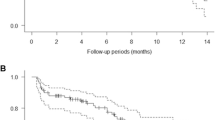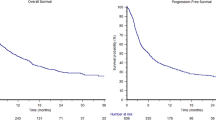Abstract
We performed a literature search that shed light on the signaling pathways involved in the sorafenib activity as first- or subsequent-line treatment, taking into account its toxicity profile. Sorafenib appears to have better tolerability when compared with other agents in the same indication. Cross-resistance between tyrosine kinase inhibitors (TKIs) may be limited, even after failure with a previous VEGFR inhibitor, but the optimal sequence with TKIs remains to be determined. Randomized trials of second-line treatment options have showed either modest or no differences in terms of progression-free and overall survival (OS). Direct comparison between sorafenib and axitinib demonstrated differences in terms of PFS in favor of axitinib, but not in terms of OS as second-line treatment. In contrast, a phase III study showed a benefit in OS, favoring sorafenib when compared with temsirolimus. In conclusion, after using other VEGF inhibitor such as sunitinib, sorafenib is active and safe for the treatment of patients with advanced or metastatic RCC.

Similar content being viewed by others
References
Motzer RJ, Hutson TE, Tomczak P et al (2009) Overall survival and updated results for sunitinib compared with interferon alfa in patients with metastatic renal cell carcinoma. J Clin Oncol 27:3584–3590
Escudier B, Eisen T, Stadler WM et al (2007) Sorafenib in advanced clear-cell renal-cell carcinoma. N Engl J Med 356:125–134
Escudier B, Eisen T, Stadler WM et al (2009) Sorafenib for treatment of renal cell carcinoma: final efficacy and safety results of the phase III treatment approaches in renal cancer global evaluation trial. J Clin Oncol 27:3312–3318
Bellmunt J, Guix M (2009) The medical management of metastatic renal cell carcinoma: integrating new guidelines and recommendations. BJU Int 103:572–577
Motzer RJ, Hutson TE, Tomczak P et al (2007) Sunitinib versus interferon alfa in metastatic renal-cell carcinoma. N Engl J Med 356:115–124
Calvo E, Escudier B, Motzer RJ et al (2012) Everolimus in metastatic renal cell carcinoma: subgroup analysis of patients with 1 or 2 previous vascular endothelial growth factor receptor-tyrosine kinase inhibitor therapies enrolled in the phase III RECORD-1 study. Eur J Cancer 48:333–339
Motzer RJ, Escudier B, Oudard S et al (2008) Efficacy of everolimus in advanced renal cell carcinoma: a double-blind, randomised, placebo-controlled phase III trial. Lancet 372:449–456
Motzer RJ, Escudier B, Oudard S et al (2010) Phase 3 trial of everolimus for metastatic renal cell carcinoma: final results and analysis of prognostic factors. Cancer 116:4256–4265
U.S. Food and Drug Administration (U.S. FDA). INLYTA(R) (Axitinib). http://www.fda.gov/downloads/AdvisoryCommittees/CommitteesMeetingMaterials/Drugs/OncologicDrugsAdvisoryCommittee/UCM283657.pdf. Access date: 1 July 2012
Rini BI, Escudier B, Tomczak P et al (2011) Comparative effectiveness of axitinib versus sorafenib in advanced renal cell carcinoma (AXIS): a randomised phase 3 trial. Lancet 378:1931–1939
Lowy DR, Willumsen BM (1993) Function and regulation of Ras. Annu Rev Biochem 62:851–891
Bos JL (1989) Ras oncogenes in human cancer: a review. Cancer Res 49:4682–4689
Naumann U, Eisenmann-Tappe I, Rapp UR (1997) The role of Raf kinases in development and growth of tumors. Recent Results Cancer Res 143:237–244
Chong H, Lee J, Guan KL (2001) Positive and negative regulation of Raf kinase activity and function by phosphorylation. EMBO J 20:3716–3727
Malumbres M, Barbacid M (2003) RAS oncogenes: the first 30 years. Nat Rev Cancer 3:459–465
Davies H, Bignell GR, Cox C et al (2002) Mutations of the BRAF gene in human cancer. Nature 417:949–954
Rajagopalan H, Bardelli A, Lengauer C et al (2002) Tumorigenesis: RAF/RAS oncogenes and mismatch-repair status. Nature 418:934
Wilhelm SM, Carter C, Tang L et al (2004) BAY 43–9006 exhibits broad spectrum oral antitumor activity and targets the RAF/MEK/ERK pathway and receptor tyrosine kinases involved in tumor progression and angiogenesis. Cancer Res 64:7099–7109
Wilhelm S, Housley T, Kennure N (2001) A novel diphenylurea Raf kinase inhibitor (RKI) blocks the Raf/MEK/ERK pathway in tumor cells. Proc Am Assoc Cancer Res 42:923
Wilhelm S, Chien DS (2002) BAY 43–9006: preclinical data. Curr Pharm Des 8:2255–2257
Folkman J (1992) The role of angiogenesis in tumor growth. Semin Cancer Biol 3:65–71
Na X, Wu G, Ryan CK et al (2003) Overproduction of vascular endothelial growth factor related to von Hippel–Lindau tumor suppressor gene mutations and hypoxia-inducible factor-1 alpha expression in renal cell carcinomas. J Urol 170:588–592
Kerbel R, Folkman J (2002) Clinical translation of angiogenesis inhibitors. Nat Rev Cancer 2:727–739
Lyons JF, Wilhelm S, Hibner B et al (2001) Discovery of a novel Raf kinase inhibitor. Endocr Relat Cancer 8:219–225
Strumberg D, Richly H, Hilger RA et al (2005) Phase I clinical and pharmacokinetic study of the Novel Raf kinase and vascular endothelial growth factor receptor inhibitor BAY 43–9006 in patients with advanced refractory solid tumors. J Clin Oncol 23:965–972
Moore M, Hirte HW, Siu L et al (2005) Phase I study to determine the safety and pharmacokinetics of the novel Raf kinase and VEGFR inhibitor BAY 43–9006, administered for 28 days on/7 days off in patients with advanced, refractory solid tumors. Ann Oncol 16:1688–1694
Clark JW, Eder JP, Ryan D et al (2005) Safety and pharmacokinetics of the dual action Raf kinase and vascular endothelial growth factor receptor inhibitor, BAY 43–9006, in patients with advanced, refractory solid tumors. Clin Cancer Res 11:5472–5480
Negrier S, Jager E, Porta C et al (2010) Efficacy and safety of sorafenib in patients with advanced renal cell carcinoma with and without prior cytokine therapy, a subanalysis of TARGET. Med Oncol 27:899–906
Stadler WM, Figlin RA, McDermott DF et al (2010) Safety and efficacy results of the advanced renal cell carcinoma sorafenib expanded access program in North America. Cancer 116:1272–1280
Beck J, Procopio G, Bajetta E et al (2011) Final results of the European Advanced Renal Cell Carcinoma Sorafenib (EU-ARCCS) expanded-access study: a large open-label study in diverse community settings. Ann Oncol 22:1812–1823
Dudek AZ, Zolnierek J, Dham A et al (2009) Sequential therapy with sorafenib and sunitinib in renal cell carcinoma. Cancer 115:61–67
Sablin MP, Negrier S, Ravaud A et al (2009) Sequential sorafenib and sunitinib for renal cell carcinoma. J Urol 182:29–34; discussion 34
Vickers MM, Choueiri TK, Rogers M et al (2010) Clinical outcome in metastatic renal cell carcinoma patients after failure of initial vascular endothelial growth factor-targeted therapy. Urology 76:430–434
Porta C, Procopio G, Carteni G et al (2011) Sequential use of sorafenib and sunitinib in advanced renal-cell carcinoma (RCC): an Italian multicentre retrospective analysis of 189 patient cases. BJU Int 108:E250–E257
Heng DYC, Lee J-L, Harshman LC et al (2012) A population-based overview of sequences of targeted therapy in metastatic renal cell carcinoma (mRCC). ASCO Meeting Abstracts 30:387
Kontovinis L, Laschos K, Karadimou A et al (2012) Sequential treatment with sorafenib and sunitinib in metastatic renal cell carcinoma: clinical outcomes from a retrospective clinical study. Med Oncol 29:750–754
Rini BI, Escudier BJ, Michaelson MD et al (2012) Phase III AXIS trial for second-line metastatic renal cell carcinoma (mRCC): effect of prior first-line treatment duration and axitinib dose titration on axitinib efficacy. ASCO Meeting Abstracts 30:354
Gore ME, Jones RJ, Ravaud A et al (2011) Efficacy and safety of intrapatient dose escalation of sorafenib as first-line treatment for metastatic renal cell carcinoma (mRCC). ASCO Meeting Abstracts 29:4609
Hutson TE, Escudier B, Esteban E et al (2012) Temsirolimus vs. sorafenib as second line therapy in metastatic renal cell carcinoma: results from the INTORSECT trial. Ann Oncol 23(suppl 9):IXE14
Michel MS, Vervenne W, Goebell PJ et al (2012) Phase III randomized sequential open-label study to evaluate efficacy and safety of sorafenib (SO) followed by sunitinib (SU) versus sunitinib followed by sorafenib in patients with advanced/metastatic renal cell carcinoma without prior systemic therapy (SWITCH Study): safety interim analysis results. ASCO Meeting Abstracts 30:4539
Garcia JA, Hutson TE, Elson P et al (2010) Sorafenib in patients with metastatic renal cell carcinoma refractory to either sunitinib or bevacizumab. Cancer 116:5383–5390
Sabbatini R, Porta C, Procopio G (2009) Use of tyrosine kinase inhibitors (TKI) in hemodialitic metastatic renal cell carcinoma patients. Eur Urol 8:185 (Abstract 258)
Calvani N, Morelli F, Leo S et al (2012) Sequential use of sorafenib and sunitinib in advanced renal cell carcinoma: does the order of sequencing matter? Med Oncol 29(3):1908–1913
Protzel C, Ruppin S, Klebingat KJ et al (2008) Sorafenib for the treatment of metastatic renal cell carcinoma with chronic renal failure. Onkologie 31(Supp 1):PE591
Maroto P, Villavicencio H (2008) Sorafenib: tolerance in Patients on Chronic Hemodialysis. Oncology 74:245–246
Hilger RA, Richly H, Grubert M et al (2009) Pharmacokinetics of sorafenib in patients with renal impairment undergoing hemodialysis. Int J Clin Pharmacol Ther 47:61–64
Ruppin S, Protzel C, Klebingat KJ et al (2009) Successful sorafenib treatment for metastatic renal cell carcinoma in a case with chronic renal failure. Eur Urol 55:986–988; quiz 988
Bellmunt J, Eisen T, Fishman M et al (2011) Experience with sorafenib and adverse event management. Crit Rev Oncol Hematol 78:24–32
Szczylik C, Cella D, Eisen T et al (2008) Comparison of kidney cancer symptoms and quality of life (QoL) in renal cell cancer (RCC) patients (pts) receiving sorafenib vs interferon-{alpha} (IFN). ASCO Meeting Abstracts 26:9603
Acknowledgments
The authors acknowledge the editorial assistance of Fernando Sánchez Barbero from HealthCo SL (Madrid, Spain), which was founded by Bayer Hispania.
Conflict of interest
The authors declare that they have no conflict of interest relating to the publication of this manuscript.
Author information
Authors and Affiliations
Corresponding author
Rights and permissions
About this article
Cite this article
Afonso, F.J., Anido, U., Fernández-Calvo, O. et al. Comprehensive overview of the efficacy and safety of sorafenib in advanced or metastatic renal cell carcinoma after a first tyrosine kinase inhibitor. Clin Transl Oncol 15, 425–433 (2013). https://doi.org/10.1007/s12094-012-0985-x
Received:
Accepted:
Published:
Issue Date:
DOI: https://doi.org/10.1007/s12094-012-0985-x




